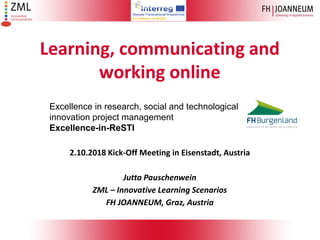Keynote: Learning, communicating and working online
- 1. Learning, communicating and working online Excellence in research, social and technological innovation project management Excellence-in-ReSTI 2.10.2018 Kick-Off Meeting in Eisenstadt, Austria Jutta Pauschenwein ZML – Innovative Learning Scenarios FH JOANNEUM, Graz, Austria
- 2. Jutta Pauschenwein: Online ReSTI 2.10.2018 About myself & ZML - Head of ZML-Innovative Learning Scenarios at FH JOANNEUM - Former theorectical physicist – using an online network already in the eighties - Professional identity as e-convener / e-moderator 2 Current research activities: - visualization in teaching and training - reflection-in-action, - game-based learning, - MOOCs
- 3. Jutta Pauschenwein: Online ReSTI 2.10.2018 Team of 10 people: teacher, sociologist, psychologist, librarian, physicist, technician, …
- 4. Jutta Pauschenwein: Online ReSTI 2.10.2018 4 Change Technology is a key driver for innovation Drives: how we live, communicate, work, learn My experience: online & offline is equally useful, fun, difficult, annoying We blend on & off in our daily live without thinking about it! => useful competence for work & learning
- 5. Jutta Pauschenwein: Online ReSTI 2.10.2018 Online learning Online ecologies / spaces Online materials Online communication Online collaboration 5
- 6. Jutta Pauschenwein: Online ReSTI 2.10.2018 „Blended“ learning Mix online & offline ! Mix synchronous & asynchronous ! 6 f2f f2f f2f online meeting online start f2f = face to face session online meetings
- 7. Jutta Pauschenwein: Online ReSTI 2.10.2018 Example - Start online in a discussion forum: saying hello, getting to know each other, preparing for the first presence meeting - Presence: f2f workshop: appreciate what was done online (needs time), give input, support interaction, plan next online phase (needs time) - Asynchronous online learning: do tasks alone or in groups - Synchronous online meeting: moderated discussion in video conference, webinar with expert - Asynchronous online learning: prepare for the next presence meeting - And so on 7
- 8. Jutta Pauschenwein: Online ReSTI 2.10.2018 „Distance“ learning – only online Online courses: - E-moderating: four weeks online to learn the art of supporting online groups 8 MOOCs – massive open online courses Open/diverse/ autonomous/ connected
- 9. Jutta Pauschenwein: Online ReSTI 2.10.2018 Thoughts and questions I believe that - teachers need e-competences: online moderation, how to build/structure online learning material, online communication, … => invest into teacher training - learners need an open learning space and diverse tasks to foster emergent learning, to learn what they need/want to learn - we should use all the tools the learners use privately and in work (was also a recommendation by Gilly Salmon) My questions are: - How to deal with GDPR issues (general data protection regulation)? - How important is knowledge about facts nowadays? 9
- 10. Jutta Pauschenwein: Online ReSTI 2.10.2018 Literature - SIEMENS, Georg (2005). Connectivism: A Learning Theory for the Digital Age. In: International Journal of Instructional Technology and Distance Learning, Vol. 2 No. 1, Jan 2005. - SALMON, Gilly (2012). E-moderating: The key to online teaching and learning. Routledge. - SALMON, Gilly (2013). E-tivities: The key to active online learning. Routledge. - SCHÖN, Donald, A. (1983). The reflective practitioner: How professionals think in action. Basic Books.Schön, Donald A. (1987). Educating the reflective practitioner: Toward a new design for teaching and learning in the professions. Jossey-Bass. - SCHÖN, Donald A. (1987). Educating the reflective practitioner: Toward a new design for teaching and learning in the professions. Jossey-Bass. - SOUSANIS, Nick (2015) Unflattening: A Visual-Verbal Inquiry into Learning in Many Dimensions. Harvard University Press - WEICK, Karl E. (1995). Sensemaking in Organization. Sage Publications: Thousand Oaks - WENGER, Etienne (1998). Communities of Practice: Learning, Meaning and Identity. Cambridge: Cambridge University Press. - WILLIAMS, Roy, KARAOUSU, R., & MACKNESS, Jenny (2011). Emergent Learning and Learning Ecologies in Web 2.0. The International Review of Research in Open and Distance Learning, 12(3) - WILLIAMS, Roy, MACKNESS, Jenny, & Gumtau, S. (2012). Footprints of Emergence. The International Review of Research in Open and Distance Learning, 13(4). 10
- 11. Jutta Pauschenwein: Online ReSTI 2.10.2018 Thank you for your attention Jutta Pauschenwein zml.fh-joanneum.at zmldidaktik.wordpress.com oer.fh-joaneum.at/zml 11











